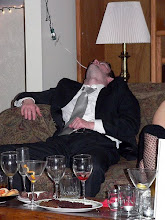 |
| fig. 1: Not Bond Villains |
Watching On Her Majesty's Secret Service, I wondered a bit at what the George Lazenby Era of the franchise might have looked like, had he stayed on for the bulk of his contract. Though he has his charms, Lazenby doesn't have the ironic distance of Moore, or the subtle menace of Connery. He's earnest, more than anything, a quality that seems ill-suited for an international spy. This is, famously, the only film in which James Bond (nearly) cries. And, sure, it's after the brutal murder of his wife, but it's hard to imagine Daniel Craig or Timothy Dalton, the two other actors in the franchise who have been written in a more humanistic way, reacting with anything other than smoldering rage at the whole business. Craig gets off a clipped "the bitch is dead" at the demise of Vesper Lynd, a line that's verbatim from the Casino Royale novel, and saved only by Craig's repressed-tough-guy delivery, and some exposition by Judy Dench.
Speaking of Craig, OHMSS is the movie where James Bond falls in love, and, as such, it's a first in an every-other-Bond series of attempts to position the character as a more straightforward romantic lead, and to humanize him. You can infer that Bond falls in love with whomever he ends up stranded on some raft with by the end of a given picture, but with a few exceptions, that's not really text on screen. He's generally understood to be in it for less straightforwardly-romantic reasons. As a movie where Bond meets the great love of his life, this film draws quite a few obvious parallels to 2006's Casino Royale, as well as Spectre, in the latter's wintry Alpine setting and female lead, Lea Seydoux's Madeline Swann, with whom it's inferred Craig's Bond walks off into the sunset. Although, if this is the film that positions James Bond as a romantic lead, it of course goes about it in a very James Bond sort of way, which is to say he still has time (and inclination) in the middle act of this film to fuck his way through a harem of would-be assassins brainwashed by his nemesis to be delivery systems for his crop-destroying mega-virus.
Like you do.
Tracy Bond (nee Countess Teresa di Vicenzo) casts a long shadow over the franchise. Or, at least, her death does. Of all the Bond Girls with the exception of Vesper, she's the most complicated. She's suicidal, suffering from depression, a divorcee who lost a child, prickly, and a daredevil behind the wheel. In the film as well as the novel, she challenges Bond, remains an enigma to him. It's a pity, then, that she's reduced to "the one that died." Perhaps as an inevitable consequence of the film's emotional investment in her when it still has an eye on the next sequel, Tracy's number was always going to be up, though I would have vastly preferred that her legacy to the franchise be for slightly more nuanced female characters, going forward.
 |
| fig. 2: Lady Olenna in her hey day. |
Blofeld's status as a Count hangs on his (lack of) earlobes, a congenital defect apparently shared by members of the Bleauchamp family, the sort of crumbling European dynasty where these sorts of things tend to crop up. Bond states that Blofeld had his ears fixed, making his the first physical quirk actively sought out by a character in a franchise full of an obsession with deformity and physical weirdness. He's played here by Telly Savalas, continuing a tradition of one-and-done Blofelds. Savalas not only switches faces from the previous installment's Donald Pleasance, but nationalities as well, making no attempt at hiding his American accent. This makes him, by default, the first American supervillain in the series, and another American overly invested in a purported connection to European royalty.
 |
| fig. 3: It happens. |
This royalty idea is how he defines himself. He even makes it one of the conditions of his latest ransom of the world, that he be recognized as the person he says he is. It's easy to draw a parallel between his character here and the one we get in Spectre. As part of that film's shoehorned retcon, its reborn Ernst Stavro Blofeld was, once upon a time, lil' Franz Oberhauser, winter sports enthusiast and sorta-brother to James Bond. It's a silly misdirect, in the vein of the latest Star Trek film trying to lampshade that series' most iconic villain behind a name change, but it has the effect of making the identity that Spectre's Blofeld carves for himself similar to the one in OHMSS: built out of the scraps of another history. Chosen, rather than given.
What happens at the edges, then, of On Her Majesty's Secret Service, is a duel of identities. Blofeld's pretension to nobility. Bond's "bachelor's taste for freedom" undermined for the first time. Even the recasting of the character lends the movie the feel of answering the question of who James Bond is. For the first time, the answer isn't Sean Connery.




No comments:
Post a Comment